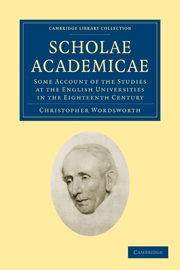 Scholae Academicae
Scholae Academicae Book contents
- Frontmatter
- PREFACE
- Contents
- CHAPTER I GENERAL INTRODUCTION
- CHAPTER II THE TRIPOS, name and thing
- CHAPTER III THE SOPHS' SCHOOLS before 1765
- CHAPTER IV ACTS AND OPPONENCIES after 1772
- CHAPTER V THE SENATE-HOUSE
- CHAPTER VI THE ADMISSION OF QUESTIONISTS. Huddling
- CHAPTER VII THE MATHEMATICKS
- CHAPTER VIII THE TRIVIAL ARTS
- CHAPTER IX HUMANITY
- CHAPTER X MORALS AND CASUISTRY
- CHAPTER XI LAW
- CHAPTER XII MODERN STUDIES
- CHAPTER XIII ORIENTAL STUDIES
- CHAPTER XIV PHYSICK
- CHAPTER XV ANATOMY
- CHAPTER XVI CHEMISTRY
- CHAPTER XVII GEOLOGY AND MINERALOGY
- CHAPTER XVIII BOTANY
- CHAPTER XIX The Degree of M.A.
- CHAPTER XX MUSICK
- CHAPTER XXI ASTRONOMY
- CHAPTER XXII CONCLUSION
- APPENDICES
- INDEX
CHAPTER I - GENERAL INTRODUCTION
Published online by Cambridge University Press: 07 September 2010
- Frontmatter
- PREFACE
- Contents
- CHAPTER I GENERAL INTRODUCTION
- CHAPTER II THE TRIPOS, name and thing
- CHAPTER III THE SOPHS' SCHOOLS before 1765
- CHAPTER IV ACTS AND OPPONENCIES after 1772
- CHAPTER V THE SENATE-HOUSE
- CHAPTER VI THE ADMISSION OF QUESTIONISTS. Huddling
- CHAPTER VII THE MATHEMATICKS
- CHAPTER VIII THE TRIVIAL ARTS
- CHAPTER IX HUMANITY
- CHAPTER X MORALS AND CASUISTRY
- CHAPTER XI LAW
- CHAPTER XII MODERN STUDIES
- CHAPTER XIII ORIENTAL STUDIES
- CHAPTER XIV PHYSICK
- CHAPTER XV ANATOMY
- CHAPTER XVI CHEMISTRY
- CHAPTER XVII GEOLOGY AND MINERALOGY
- CHAPTER XVIII BOTANY
- CHAPTER XIX The Degree of M.A.
- CHAPTER XX MUSICK
- CHAPTER XXI ASTRONOMY
- CHAPTER XXII CONCLUSION
- APPENDICES
- INDEX
Summary
‘Books were there
Bight many, and in seeming fair.
But who knows what therein might be
'Twixt board and board of oaken tree?’
The Ring given to Venus.—W. Morris.The eighteenth century is hardly far enough removed from us to be canonized among ‘the good old times,’ and the tradition of abuses which have been since reformed or partially reformed, is sufficiently strong an advocatus diabolic to deter us even from beatifying it.
Nevertheless, if we search into its records, we shall, I believe, find no lack of interest in them, though in form (with the exception of such books as Boswell's Johnson) they are apt to be almost repulsive.
Considering the two great shocks which England had sustained in the preceding sixty years, the last century, or at least the reign of Queen Anne, might be said to have opened hopefully.
Politically there was not sufficient cause for either Jacobite or Whig to despair for the future ; the star of the national army and navy was in the ascendant, and our commercial prospects had markedly improved even before the Revolution. The Church was improved in temporalities by the Queen, in respect both of her fabrics and of her poverty-stricken clergy: the Lower House of Convocation was making efforts to revive ecclesiastical discipline, and to repress immorality.
- Type
- Chapter
- Information
- Scholae AcademicaeSome Account of the Studies at the English Universities in the Eighteenth Century, pp. 1 - 15Publisher: Cambridge University PressPrint publication year: 2009First published in: 1877


